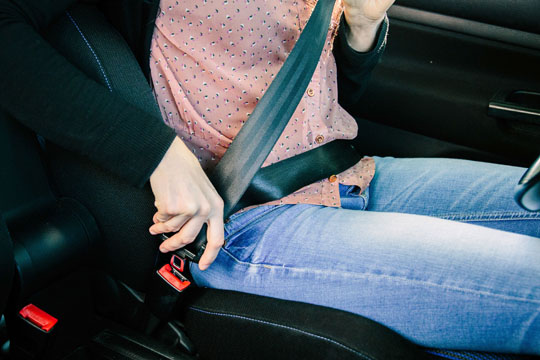Improving Automotive Safety Restraint Systems
Freiburg, Apr 10, 2017
They sponsor students studying abroad and as they do research, support scholars working on projects, and give instructors opportunities to implement new ideas in their seminars and lectures. The 51 foundations of the University of Freiburg all reflect the unmistakable characters of their founders. Sara Schwartzkopf is presenting some of these organizations in a series of articles.
 How can automobile safety restraint systems, for example seatbelts, be made more reliable? The foundation named after its founder, Kurt Steim, is also dedicated to promoting scientific work in his former field. Photo: Sandra Meyndt
How can automobile safety restraint systems, for example seatbelts, be made more reliable? The foundation named after its founder, Kurt Steim, is also dedicated to promoting scientific work in his former field. Photo: Sandra Meyndt
The University of Freiburg presents the Dr. Kurt Steim Award annually at the start of the academic year in October. The foundation funding the award promotes research into injuries resulting from vehicle accidents and ways to avoid them. The Stuttgart-based organization places a particular emphasis on the relationship between injuries resulting from vehicle accidents and improving safety restraint systems. That is no surprise. Kurt Steim was a businessman who produced track recoil springs for seatbelts at his company in Schramberg. Steim received Germany's Federal Cross of Merit, First Class, and was an honorary senator of the University of Freiburg.
What sounds like a niche issue is actually a topic that encompasses many disciplines. Among these are sports medicine, orthopedics and trauma surgery. The spectrum of research supported by the foundation ranges from pain perception to transplantation to implants. Frequently, these projects are working at the interface where medicine and technology meet. Last year's award winner, Dr. Martin Zens, developed sensors made of the silicon-based polymer polydimethylsiloxane (PDMS), for example. This new type of medical aid allows the stability of the knee to be measured without surgery.
Pleased to be appreciated
Zens also tested how suitable these sensors are for use in clinical settings. "My work addressed instability after traumatic knee injuries and what are known as ruptured ligaments in particular," he explains. He used the funds he received to travel to Sri Lanka and complete a course in emergency medicine. Zens says, "I am very grateful to the foundation for honoring my research work and for promoting young academics. In addition to the monetary award, the pleasure above all of having my work valued is an important motivation to continue my scientific work."
DM 100,000 in seed capital
The Dr. Kurt Steim Foundation was established in 1978. Back then, it had basic assets of DM 100,000. In addition to awarding the annual honor for young academics, the foundation also supports scholars and students with stipends – or with other means, as long as they promote the research aim. Each year, at the beginning of the summer semester, the University of Freiburg posts the amount that the foundation is distributing in the Faculty of Medicine. Scholars can then apply for the award. A jury, together with a member of the founding family, decides who will be honored. The foundation belongs to the endowment of the University of Freiburg. This year it is expected to distribute €2,455.
Foundations of the University of Freiburg
Some of the 51 foundations of the University of Freiburg date back to the Late Middle Ages. The 17 oldest ones form the United Academic Endowment Holding, while the newer ones – with three exceptions – belong to the Endowment Funds. The university receives the capital stock in the form of real or monetary assets and invests it. Each year it distributes two-thirds of the earnings of each foundation, while the remaining third is put aside to compensate for inflation. The donors determine who is eligible to apply for aid. As a rule, need is given greater consideration than ability. The founders have also defined in statutes the individual aims of their respective foundations.
For an overview of the foundations
Call for proposals for Freiburg’s Young Talent Awards
Starting now, Freiburg’s Young Talent awards are being given for new, emerging scientists based on extraordinary achievement in their master’s theses, dissertations and scientific papers.

